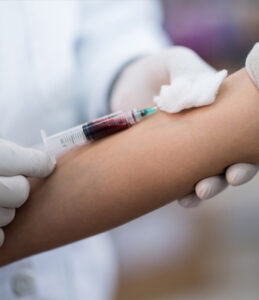HIV has existed in the United States since the mid to late 1970s, so most of us know something about it. Some lived through the height of the HIV epidemic in the mid-1980s. Now, annual infections have been greatly reduced through advances in awareness, education and treatment. Learning the basics about HIV—what it is, how it’s spread and how it’s treated can keep you healthy and prevent transmission.
What Is HIV/AIDS?
HIV stands for human immunodeficiency virus. It’s a virus that takes over certain immune system cells that defend your body. The loss of these cells, called CD4 or T cells, makes it harder for your body to stay healthy. If HIV is not treated, it can lead to AIDS. AIDS stands for acquired immunodeficiency syndrome. A person is said to have AIDS when their immune system is so weak it can’t fight off certain infections and cancers.
With proper medical care, HIV can be controlled and people with HIV can live long, healthy lives and protect their partners.
There is no cure for HIV, but most people with HIV will not develop AIDS if they get and stay on treatment. With proper medical care, HIV can be controlled and people with HIV can live long, healthy lives and protect their partners.
How Does HIV Spread?
HIV is spread mainly through four body fluids: semen, vaginal fluid, blood and breast milk. It can’t be spread through air or water, saliva, tears, closed-mouth kissing, sweat, toilets, food or drinks, hugging, shaking hands, insects or pets. The Centers for Disease Control and Prevention (CDC) has a lot of information on transmission, including answers to a lot of specific questions you may have.
What Are the Symptoms of HIV?
Most people develop HIV symptoms within two to four weeks after infection. Symptoms may last for a few days or several weeks and can include the following:
- Mouth ulcers
- Swollen lymph nodes
- Flu-like symptoms such as chills, fatigue, sore throat, fever and muscle aches
- Rash
- Night sweats
However, some people have no symptoms at all, and of course, every fever or sore throat is not an HIV infection. The only way to know if you have HIV is to get tested.
How Can I Protect Myself?
 Today, there are more tools than ever available to help protect yourself and prevent HIV.
Today, there are more tools than ever available to help protect yourself and prevent HIV.
- Get tested. It is recommended that everyone should get tested at least once in their lifetime and more often if they have certain risk factors. There are at-home tests and in-person tests, and they are often quick, free and painless. VA’s Getting Tested for HIV page offers Veterans a lot of information on the testing process, including confidentiality and privacy, how to get an appointment and much more.
- Do not share needles, syringes or other drug injection equipment if you inject drugs. If you need help with substance abuse, check out VA’s Substance Use Treatment page to get the help you deserve. You can also talk to your VA provider about safer injection practices and accessing sterile syringes. Learn more about this on VA’s HIV page.
- Use condoms the right way every time you have sex. Condoms are available via prescription at VA.
- Learn more about HIV prevention medicines such as pre-exposure prophylaxis (PrEP) and post-exposure prophylaxis (PEP). Ask your health care provider if either of these medicines is right for you.
- PrEP is a highly effective medication designed to prevent HIV infection and is available through VA.
- PEP is designed to prevent HIV after a possible exposure, but it must be taken within 72 hours to be effective.
- Avoid drug usage which may lead you to engage in risky sexual behaviors.
If you have HIV, there are many actions you can take to stay healthy and prevent transmitting it to others:
- Find the HIV care you deserve. Whether it’s through VA or another health care provider, you deserve the best care possible. VA offers a helpful Just Diagnosed page, as well as a Living With HIV page full of information related to next steps, understanding your results, nutrition information and much more.
- Take your HIV medications as prescribed and follow your treatment plan. HIV medicine can make your viral load very low or undetectable.
- Get to an undetectable viral load.
- If you have an undetectable viral load, you will not transmit HIV through sex, from mother to child during pregnancy, birth and breastfeeding or through sharing drug injection equipment.
- People with HIV who keep an undetectable viral load can live long, healthy lives.
What Treatments Are Available?
 Even though there is no cure for HIV, treatments for HIV are highly effective. With proper treatment, most people can get the virus under control within six months. Here are some things to know:
Even though there is no cure for HIV, treatments for HIV are highly effective. With proper treatment, most people can get the virus under control within six months. Here are some things to know:
- There are many different drugs that can shut down the HIV virus, greatly slow the damage it does and allow the immune system to recover.
- Studies show that starting treatment early is most effective.
- HIV drug regimens are usually simple (between one to three pills a day), but they must be taken every day, or the virus changes and makes the drugs ineffective.
- There are different types of HIV drug therapies. VA’s Treatment page provides details on the different drugs, their side effects, dosing information and much more. Talk to your health care provider and come up with a personal treatment plan.
Additional Information
- Visit VA’s HIV page to learn more about what services and resources are available to help and check out their FAQ It’s full of questions other Veterans have asked, including questions on transmission, prevention, treatment, testing and much more.
- Call the CDC’s national health information hotline at 800-232-4636. You can ask questions about HIV, learn where to get an HIV test, find resources for substance abuse management, get more information on PrEP and PEP and much more.
Let’s do our part to stop the spread of HIV. Get tested and protect yourself. If you’re living with HIV, get and continue the treatment you deserve.







